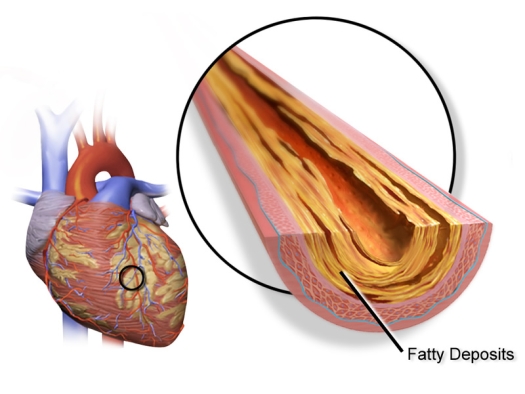CoronaryArteryDiseaseHeart.jpg

Illustration by Blausen.com staff (2014). "Medical gallery of Blausen Medical 2014". WikiJournal of Medicine.
Last article (You’ve Been Lied to About LDL Cholesterol and Heart Attacks), I showed you how the medical establishment has been lying to you about the cause of plaque formation and heart attacks. LDL cholesterol is not the bad guy they want you to believe. And the drugs to reduce LDL are not fixing the problem. In fact, they are making it worse.
After looking at all the evidence, my conclusion is that if you’re trying to decrease plaque formation by lowering LDL cholesterol, you’re wasting your time. What you need to do is to act on what really causes plaques. And that is clotting.
In the last article, I said that all plaques, while they contain very little cholesterol if any, do contain large amounts of fibrin. And there’s only one way fibrin can be in a plaque – and that is as a result of the clotting process. If you remember, I explained that fibrin also acts to stimulate the production of the smooth muscle cells found in plaques.
But that’s not all plaques contain. They also contain red and white blood cells. These cells are commonly found in clots. What’s more, the cholesterol crystals (completely different from cholesterol) often found in plaque can only come from red blood cells. The white cells serve as the source of the foam cells that are found in plaques.
So now that you know all of this, in this issue I’m going to show you how to prevent plaque from forming in your arteries. Since atherosclerosis is the number one killer in the United States, this is critical information for you. Here’s what you can do:
First, get some blood tests to assess your risk. Since cardiovascular disease is the number one cause of death, this should now be routine for everyone, even those without a family history of cardiovascular disease. That would include testing for ox-LDL levels, fibrinogen levels, fasting insulin, A1c, d-dimer, omega Index, C-reactive protein (CRP), serum homocysteine level, and of course, Lp(a).
If your ox-LDL is elevated, make sure you take antioxidant supplements, particularly vitamin E and pomegranate juice or pomegranate extract capsules. These are widely available.
If your fibrinogen is high, you can reduce it by using nattokinase (100 mg, twice daily) and turmeric (1,000 mg, twice daily), and also decreasing excess weight.
A healthy fasting insulin level should be below 10 mcU/ml. Levels higher than that act to damage the glycocalyx. Similarly, an A1c level greater than 6% indicates higher blood sugar levels that can damage the glycocalyx. The answer to both of these problems is exercise and a low-carbohydrate diet. If you believe your glycocalyx is damaged, one remedy is taking a supplement containing glucosamine and chondroitin sulfate. These are usually prescribed for arthritis, but it turns out that they can also act to repair the glycocalyx.
The d-dimer level indicates if there is any active clotting going on in your body at the time of the blood draw. A healthy level is less than 0.5 mg/L. If your levels are higher than this, have a talk with your doctor. Both COVID-19 infections and the COVID-19 injections result in high levels of d-dimer.
One of the best ways to keep a lid on clotting is with fish oil. Any of the labs can now do an omega index. The omega index is the percentage in your blood of the omega-3 fats EPA and DHA. These fats are in fish oil. Ideal levels needed to prevent heart disease are greater than 4.7%. If your level is lower, increase your fish oil intake.
If your C-reactive protein is high, it is a sign of excessive inflammation. Inflammation stimulates clotting, so you want your levels to be on the low-normal end. If yours is elevated, work with your doctor to find out why. Hint – it could be a dental problem.
An elevated serum homocysteine level greater than 15 mcmol/L has two harmful effects. One is that high levels can directly damage the endothelium. The other is that high levels interfere with the production of nitric oxide. If your homocysteine level is high, there are four supplements that can lower it: folate (0.5 to 5 mg per day), vitamin B12 (.5-1 mg per day), vitamin B6 (25 mg per day), and trimethyl glycine (2,000-4,000 mg per day).
Elevated Lp(a) levels are found in up to 30% of people. If your levels are high, you are at special risk for plaque formation, and your risk of dying from a heart attack is multiplied by two to three times. In that case, be especially aware of everything I have talked about. Additionally, take 81 mg of aspirin a day. As you know, aspirin is a very effective way to decrease clot formation. Studies have shown that doing that can reduce your risk of death by 50%. If for some reason you can’t take aspirin, take 1,000 mg of white willow bark extract a day.
As far as lowering Lp(a), three supplements have been shown to do that if only minimally. One is niacin in quite high doses, 500 to 2,000 mg per day. Additionally, taking 100 mg of CoQ10 along with 1,000 mg of vitamin C per day might be helpful.
In addition to the above, make sure you look in the archives for how to properly check your blood pressure, and that it’s acceptable for your age. Also, make sure your teeth and gums are in good shape, and not a source of infection or inflammation.
Finally, in order to maximize nitric oxide levels, be sure to have a regular aerobic exercise program, eat plenty of leafy greens, avoid drugs that lower stomach acid, and avoid antibacterial mouthwashes.
I know that most of what is in this report is pretty complex and potentially confusing. Also, it completely goes against the cholesterol brainwashing that we have had to undergo for the past 40 years. It’s often hard to break old beliefs even when the evidence is clear. So, I expect you will be like me and have to go over this material several times to get a good understanding. However, it is incredibly important. Cardiovascular disease, which we now know is caused by clotting, is by far the number one killer and life destroyer in the world. And to think that it can be prevented by simply reducing excessive clotting is a major game changer.
For those of you who want to take this to the next level, get a copy of Dr. Malcom Kendrick’s book, “The Clot Thickens.” Dr. Kendrick is a Scottish cardiologist, a pioneer in cardiovascular disease prevention, and an incredibly good writer. His book contains no less than 280 references backing up everything I have discussed and more. And, if you are consulting with a cardiologist who is not aware of the real cause of plaque, please buy a copy of Dr. Kendrick’s book for him or her. The cardiologists need this information more than any other specialty.
How to Avoid Heart Failure Naturally
Heart failure happens when the heart becomes so sick that it cannot pump blood effectively. The problem is getting more and more common in the over-65 crowd. And it carries a high risk of dying within one year of diagnosis.
In 2018, heart failure was listed as the cause of death in 13.4% of all death certificates. In the past decade, drugs that block the effect of adrenalin and the hormone angiotensin II are the major drugs that doctors use to treat patients with heart failure. But guess what? The best treatment might just be a safe and inexpensive non-patentable amino acid that can do the same thing as the drugs.
In one double-blind study, researchers treated 17 patients with heart failure with either the amino acid taurine (3 grams per day) or with CoQ10 (30 mg per day). All of them had ejection fractions less than 50%. An ejection fraction refers to the fraction of blood in the heart that is pumped out with each beat. A great ejection fraction is 65%. Less than 50% indicates a weak heart. In only 6 weeks, the patients taking the taurine had a significant improvement in their injection fractions. No improvement was seen in the CoQ10 group.
In another study, this one a double-blind, placebo-controlled study, the researchers looked at the effect of giving taurine for 4 weeks to 14 patients with heart failure. They found that compared to the placebo, taurine significantly improved the patients’ chest x-rays, ability to exert, and stethoscope findings. These are all symptoms of heart failure. Additionally, they found that the pre-ejection period decreased by 7% in the patients getting the taurine. Decreasing the pre-injection period is exactly what the drugs I mentioned above do and why they are effective. The authors concluded, “The results indicate that the addition of taurine to conventional therapy is safe and effective for the treatment of patients with congestive heart failure.”
In a third study, the researchers scored the symptoms of 24 patients with heart failure. Then they gave them 2 grams of taurine twice a day for up to 8 weeks. In 19 of the 24 patients, taurine was able to cut their scores in half. Fifteen of the patients were initially classified as having severe heart failure with a New York Heart Association functional class of III or IV. After the taurine supplementation, 13 of them improved to the point that their classification dropped to class II, an incredibly significant improvement.
Taurine is an important nutrient found in very high concentrations in excitable tissue like the heart and brain. There are three mechanisms that account for the beneficial effect of taurine in heart failure. First, taurine acts to directly increase the ability of the heart to pump more effectively. Second, taurine promotes sodium excretion through the kidney. This has the effect of decreasing the amount of blood the heart has to pump. Third, just like the drugs do, taurine decreases the actions of angiotensin II on the heart. The researchers describe this third effect this way, “Since the ACE inhibitors [angiotensin II drugs] are the mainstay in the treatment of congestive heart failure, this action of taurine is probably very important.”
Taurine occurs naturally in fish and meat, especially lamb and calf liver. It is also high in dairy, eggs, shellfish, seaweed, and brewer’s yeast. The average intake in a standard diet is 58 mg per day. In vegetarian diets, taurine is low and frequently negligible with 78% less taurine in the blood and 29% less in the urine. So, if you are a vegetarian, it might be a good idea for you to supplement with taurine. Taurine is absent of side effects at the doses mentioned above and is readily available online.
References
Azuma J, Sawamura A, et al. Usefulness of taurine in chronic congestive heart failure and its prospective application. Jpn Circ J. 1992 Jan;56(1):95-9.
Azuma J, Sawamura A, et al. Therapeutic effect of taurine in congestive heart failure: a double-blind crossover trial. Clin Cardiol. 1985 May;8(5):276-82.
Ito T, Schaffer S, et al. The effect of taurine on chronic heart failure: actions of taurine against catecholamine and angiotensin II .Amino Acids. 2014 Jan;46(1):111-9.
Malcom, Kendrick. The Clot Thickens. 2021 Columbus Publishing Ltd. ISBN: 978-1-907797-76-7.
Schaffer SW, Lombardini JB, et al. Interaction between the actions of taurine and angiotensin II Amino Acids. 2000;18(4):305-18.
“Never Suffer a Heart Attack” was originally published in Dr. Frank Shallenberger’s Second Opinion newsletter, May 2023. Used with permission.


